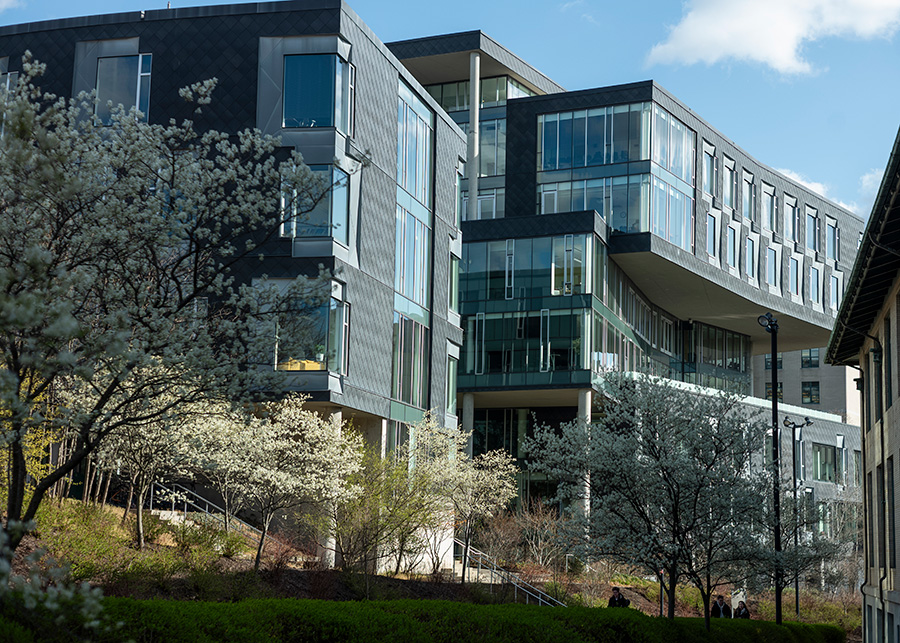Aaron AupperleeTuesday, October 21, 2025Print this page.

Ten Carnegie Mellon doctoral students pursuing artificial intelligence research will receive support from Amazon through the company’s new AI Ph.D. Fellowship Program.
The students come from across CMU’s School of Computer Science and College of Engineering. Their research tackles the foundational challenges, theoretical underpinnings and deep technological systems critical to AI innovation.
“Close collaboration between academia and industry is critical to producing groundbreaking work that will shape technologies for years to come,” said [Martial Hebe…
Aaron AupperleeTuesday, October 21, 2025Print this page.

Ten Carnegie Mellon doctoral students pursuing artificial intelligence research will receive support from Amazon through the company’s new AI Ph.D. Fellowship Program.
The students come from across CMU’s School of Computer Science and College of Engineering. Their research tackles the foundational challenges, theoretical underpinnings and deep technological systems critical to AI innovation.
“Close collaboration between academia and industry is critical to producing groundbreaking work that will shape technologies for years to come,” said Martial Hebert, dean of the School of Computer Science. “Amazon and Carnegie Mellon share a common vision that AI can transform how we work, play, shop, socialize and learn. We are grateful for Amazon’s support of foundational research in pursuit of innovation.”
Amazon’s AI Ph.D. Fellowship Program aims to help drive the innovations that will underwrite the next step in the evolution of practical AI. The program will provide two years of funding for more than 100 Ph.D. students at nine universities who are pursuing research on core AI disciplines such as machine learning, computer vision and natural language processing.
“Amazon’s AI Ph.D. Fellowship Program reflects our ongoing commitment to the academic community. We’re fortunate to collaborate with some of the nation’s brightest Ph.D. students who are advancing critical areas in AI — from high-performance chips and hardware to networking, software, foundation models, applications and more,” said Rohit Prasad, a senior vice president and head scientist for Amazon AGI. “What makes this program special is how it brings together Amazon’s real-world experience across diverse industries with the fresh perspectives of these top researchers to cultivate the next generation of AI leaders. We believe investing in future talent is essential to moving the field forward and creating truly useful AI that benefits everyone.”
Amazon selected students for the program from CMU; Johns Hopkins University; the Massachusetts Institute of Technology; Stanford University; the University of California, Berkeley; the University of California, Los Angeles; the University of Texas at Austin; the University of Illinois Urbana-Champaign; and the University of Washington.
The $68 million program provides $10 million in student funding each year and $24 million annually in Amazon Web Services (AWS) cloud-computing credits. Each fellow is also paired with an Amazon research liaison, a senior scientist working at Amazon on a topic related to the fellow’s work. Mentors will meet regularly with their fellows to offer guidance and to discuss the real-world implications of the fellows’ research.
Amazon’s AI Ph.D. Fellowship Program builds on the company’s long history of supporting academic research. Amazon and CMU recently announced the launch of the CMU-Amazon AI Innovation Hub to bolster research on generative AI, robotics, natural language processing and cloud computing technologies. Faculty and student research have received funding through the Amazon Scholar program and Amazon Research Awards, and AWS committed to supporting CMU CS Academy, allowing the free computer science curriculum for middle and high school classrooms to be hosted on its servers at no cost.
For more information on the AI Ph.D. Fellowship Program, visit the Amazon Science website.
The following students are part of the inaugural fellowship cohort.
Apurva Gandhi, Computer Science Department (CSD)

Gandhi will focus on training generally capable AI agent systems to tackle increasingly complex real-world tasks through advances in reinforcement learning, adaptive environments and scalable multi-agent infrastructure.
Karish Grover, Machine Learning Department (MLD)

Grover studies geometric foundational models for graph mining. Understanding the geometric structure can enhance representation learning for complex graphs and multimodal data systems at scale, improving recommendations, fraud detection, knowledge reasoning, infrastructure optimization and anomaly detection.
Aashiq Muhamed, MLD

Muhamed will enhance the safety of AI agents by intentionally eliciting harmful behaviors to determine the effectiveness of detecting misuse. This work could help AI agents self-correct harmful actions in real time and transform agent security into a reproducible, empirical science.
Yuxiao Qu, MLD

Qu wants to equip AI agents with the curiosity of humans. An AI system that seeks knowledge similarly to a scientist — formulating hypotheses, running experiments and drawing conclusions — could push the frontiers of discovery in scientific research, drug discovery and persistent digital assistance.
Danqing Wang, Language Technologies Institute (LTI)

Wang is working to improve the reliability and safety of LLM-based agents in complex, real-world environments by establishing benchmarks and evaluation methods, integrating security and functionality into training, and ensuring agents share only essential information to improve efficiency and minimize risks. This research will lay a strong foundation for the development of smart, trustworthy and safe AI agents.
Mengdi Wu, CSD

Wu uses machine learning techniques to automatically learn and adapt compute kernel optimization strategies for both hardware and workload. The work aims to deliver high-performance kernels across different platforms, reducing developer effort while enabling faster and more scalable model training and inference.
Xinyu Yang, Electrical and Computer Engineering (ECE)

Yang hopes to enable AI agents to scale by streamlining end-to-end training systems. The work introduces a new generative model architecture that enables multi-agent workflow within a single model runtime.
Zeji Yi, ECE

Yi seeks to apply generative models to general-purpose robotic platforms, such as humanoids and dexterous hands. This work could pave the way for next-generation foundation models for humanoid robotics with potential applications including warehouse automation and fulfillment centers.
Zichun Yu, LTI

Yu tackles the critical data-centric LLM challenge of limited organic data and the bottleneck it places on model pretraining. Yu will design and optimize synthetic data-generation systems to complement scarce organic data, improving both data quality and quantity and, ultimately, delivering better, cleaner, richer pretraining data.
Xinran Zhao, LTI

Zhao aims to enhance retrieval-augmented generation (RAG), generative AI that relies on external sources, which struggle with uncertain sources, evolving user interpretations and prior actions. Zhao’s new system improves awareness, attribution and effectiveness in complex RAG scenarios.